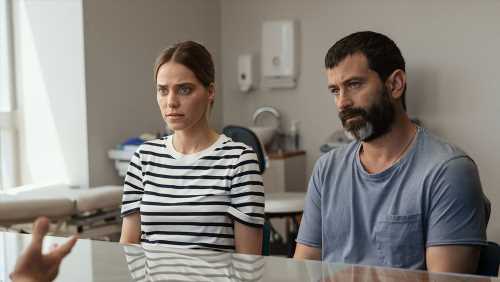Israeli surrogacy drama series “A Body That Works” has an international trailer, shared with Variety by Keshet International, which handles distribution, in the run-up to the title’s Series Mania international premiere.
Created by Shira Hadad, Dror Mishani and Shay Capon, who also directs, the series shows one couple’s struggle to get pregnant. After suffering another miscarriage, Ellie and Ido (Rotem Sela and “Fire Dance” star Yehuda Levi, awarded at the French TV fest only last year) make a life-changing decision: it’s time to consider surrogacy.
The eight-episode show is produced by Kuma Studios and broadcasted by Keshet 13 where it has proved a big hit in Israel, building ratings episode-by-episode, a rare TV phenomenon in the country.
“In Israel, surrogacy has been legal since 1997. However, unlike the U.S., it’s monitored by the state. You can’t do it just because you don’t want to get stretch marks. You have to prove there is a medical problem that prevents you from getting pregnant,” Shira Hadad tells Variety.
“I wanted to make this show for personal reasons: My son was born through surrogacy almost 10 years ago. I went through it too, even though, luckily for me, it was much less dramatic.”
“We have been friends for many years and Shira convinced me there was so much dramatic potential in this ‘triangle.’ We could tell so many different stories this way. About what it means to be a parent, a partner, and what is the price you are willing to pay for it,” adds Dror Mishani.
As their characters commit to the process and choose their surrogate Chen (Gal Malka), they also have to deal with other people’s opinions. Including those of their own “loving but difficult” parents, who aren’t always supportive.
“We became interested in the many ways parents hurt and wound their children. In how we bring these wounds into our romantic relationships, how they affect us when we become parents ourselves. Surrogacy is a very specific topic, but parenthood is the most universal one you could think of,” says Hadad.
But the relationship between the main trio also creates friction – pretty much from their very first meeting, ending in an emotional outburst in a women’s bathroom.
“It’s the first time I wrote a scene set somewhere I’ve never been. For all I know, it could have been set on the moon,” laughs Mishani.

“There is the official meeting when they try to say all the right things. Then there is the real meeting, when they try to understand each other. It’s time for these masks to come off.”
While surrogacy is the main theme of the show, its characters are not just parents, they are people. People with jobs, ambitions and even unexpected crushes.
“We share a literary background with Shira. We used to be editors, writers. In literature, people relate to each other in so many ways. Some of them are obvious, others more subtle. We understood this show is also being in a mutually creative process,” notes Mishani, with his co-writer adding:
“Ellie had 20 different occupations before we made her a literary editor. We went for it, because there is something very intimate about editing someone’s words. Just like carrying someone’s baby.”
“A Body That Works” doesn’t shy away from the reality of what it means to be pregnant or, at the very beginning, what it means to miscarry.
“For a show that’s supposed to end with life, it made sense to start with death,” says Mishani.
Hadad notes: “If I could write three episodes about everything Ellie went through, I would. The question of when to begin was something that we discussed for a long time. It was very important to be honest and not show some ideal pregnancy that gives you that ‘glow.’”
The show has already ignited discussions in Israel, they say. But at the moment, they are happy to listen to them from afar.
“We are both very private people and if we think of this series as your baby, now it has a life of its own. The debate is going on, but I am not sure we are needed there,” says Hadad, with Mishani promising to open a Facebook account if it gets picked up by a major streamer.
“What I like about people’s reaction is that they are forced to take sides and then change their minds. I am watching it now with my daughter, and she goes: ‘I like Ellie, I don’t Chen. I like Chen, I don’t like Ellie’,” he adds.
“In Israel, pregnancy is viewed as public property. People have no qualms about touching women’s bellies. But in the show, we show the absence of it. The baby is growing, but you are not the one carrying it. There is still shame connected to that, at least in our local context.”
Read More About:
Source: Read Full Article


